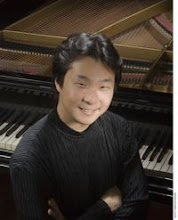The other day, during a chamber music rehearsal, some of the students starting talking about one of Curtis' hotshot pianists who is currently enjoying a fantastic international solo career with one of the industry's highest-octane managements. Evidently, this person has an obsession with clothes shopping, buying hats like Amelda Marcos bought shoes, and even racked up an $800 cell phone bill at one point. The kids sighed and pined that it must be nice to have such a career to be able to afford that kind of lifestyle. At this point, my Dave Ramsey-indoctrinated motor-mouth kicked in, pointing out that if this person didn't get a hold of their finances immediately, they would be soon spending their way into fiscal - and professional - oblivion. I can't think of a single music student that doesn't have the starry-eyed dream of winning a major orchestra job, or being picked up by a big management for a superstar solo career, thinking that such a move would be the answer to all their financial dreams forever-and-ever-amen. But with ever increasing numbers on the classical music "supply" end of the chain and diminishing "demands" on the other, winning major jobs and getting major management is becoming more and more akin to winning the mega-million lottery. Even the folks who are enjoying careers in the big orchestras (and i know several) will attest that most of them are up to their eyeballs in debt, and that orchestra life is akin to working in a Dilbert-esque cubicle, with conductors for "bosses" (shudder). On the other hand, few people see the un-glamorous side of touring as a soloist: running like crazy through airports to catch connecting flights (or waiting for delayed ones), dealing with late or missing baggage, holing up in miserable hotels, ordering Chinese food or Chef-Boyardee cans for affordable meals between concerts, wondering how in the world one is supposed to come away with anything after travel expenses, lodging, food, taxes, and management take their bites out of paltry artist fees. Rather than pin all one's hopes and dreams on winning pie-in-the-sky jobs that don't actually pay that much, i proposed to the students that they begin thinking about sound financial principles, like spending less than they earn, staying away from credit cards, and investing 15% of their income into growth financial products like mutual funds. According to Dave Ramsey, the average family income in America today is $40,000 per year. I'm going to borrow one of his financial examples and have a little fun breaking that down into terms an average musician can work with, one that doesn't enjoy a big orchestra job or a major solo (or chamber ensemble) career. $40,000/year breaks down to about $3,333 per month. If i were to offer private lessons at $40 per lesson, i would need to teach 83 lessons per month, or about 20-21 lessons per week - roughly 4-5 lessons a day, and that's leaving my weekends completely free! Even if i were to be more modest with my lesson fee - say, teaching at only $25 per lesson, i would only need to teach 33 lessons per week - the extra 13 lesson load could easily be added onto a Saturday (the most popular teaching day for musicians, btw), or spread out so that weekdays have 5 lessons each and Saturdays would only have to have 8. $40,000 doesn't sound like a lot, i know...but hold on. Let's say i'm really good about staying away from debt and have the discipline to invest 15% of that income into good mutual funds which average a 12% rate of return over the long haul, starting from the age of 20 fresh out of Curtis - i mean, college. 15% of $40,000 is $6,000 per year, or a monthly withdrawal of only $500 ($125 per week, if you want an even smaller breakdown). With the magic of compound interest (and using a cool online compound interest calculator from www.monkeychimp.com), we can see that even if this poor musician never has another student added to his teaching load - even if he never wins that fabled job, or get recognized for his amazing talent by IMG - if he can maintain his investing discipline, by the time this person is ready to retire at age 65, his investment nest egg will be worth $10,111,231.44. Let me repeat that number: Age 65 = $10,111,231.44. Ok, so you know that most musicians tend to hang around and teach way past the age of 65 - average cut off age tends to be 80. At age 80, with no significant career improvement and no increase in teaching fees, this musician will then be worth $55,595,009.88. Let me repeat. $55,595,009.88. No orchestra job, no solo career, no platinum records breaking all sales records. Just a humble teacher, teaching a handful of students each week, being wise with his money and disciplined with his savings and investments. For a more humble look at just making your first million, you would be 46 years old with $1,124,484.47. Yes, i'm really kicking myself for not having known this when i was a 20-year old fresh out of Curtis. But there's no better time to start like the present!
Hugh SungHugh Sung
Hugh SungHugh Sung
Hugh SungHugh Sung
Hugh SungHugh Sung
Hugh SungHugh Sung
Hugh Sung
Technorati : Dave Ramsey, career, debt, hugh sung, hugh-sung, investment, millionaire, piano, saving
Del.icio.us : Dave Ramsey, career, debt, hugh sung, hugh-sung, investment, millionaire, piano, saving
Ice Rocket : Dave Ramsey, career, debt, hugh sung, hugh-sung, investment, millionaire, piano, saving
Flickr : Dave Ramsey, career, debt, hugh sung, hugh-sung, investment, millionaire, piano, saving
Zooomr : Dave Ramsey, career, debt, hugh sung, hugh-sung, investment, millionaire, piano, saving
Buzznet : Dave Ramsey, career, debt, hugh sung, hugh-sung, investment, millionaire, piano, saving
Riya : Dave Ramsey, career, debt, hugh sung, hugh-sung, investment, millionaire, piano, saving
43 Things : Dave Ramsey, career, debt, hugh sung, hugh-sung, investment, millionaire, piano, saving

